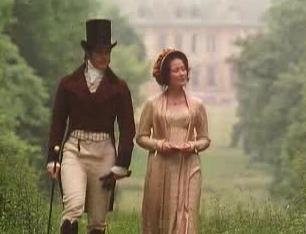 One of the things that never ceases to amaze me in Jane Austen’s writing is how many different ways I can view the characters. Developing different sides of a character is part of the fun of writing Austen variations, but I’ve also found that my opinions of the original characters has changed over the years as I’ve re-read it and learned more about the historical period.
One of the things that never ceases to amaze me in Jane Austen’s writing is how many different ways I can view the characters. Developing different sides of a character is part of the fun of writing Austen variations, but I’ve also found that my opinions of the original characters has changed over the years as I’ve re-read it and learned more about the historical period.
The classic case for this is Mr. Bennet. For years I found him amusing and admirable in his devotion to Elizabeth, then one day I realized that there’s almost nothing likeable about the man. He’s neglectful and verbally abusive of his wife and children, he doesn’t protect his daughters when he should, he makes no efforts to avoid leaving them all in the lurch when he dies, and he has the nerve to laugh at Jane’s heartbreak over Bingley. Mrs. Bennet may be silly, but she does take care of her girls and plans for their future.
Recently, as I’ve taken part in the P&P200 project and looked at the main characters from an outside point of view, I’ve seen other changes. I’ve started to notice Elizabeth’s immaturity in the way she dismisses her friendship with Charlotte when her friend makes a decision she doesn’t like, her cavalier disregard for the future (so like her father in that way!), her ready acceptance of Wickham’s blandishments, and how very willing she is to blacken Darcy’s name after the Meryton Assembly.
The latest casualty in my assessment of characters is Colonel Fitzwilliam. I wouldn’t even have thought it possible to change my opinion of him, since in many ways he’s more of a plot device than a character. He appears in many of my books, usually promoting a match between Darcy and Elizabeth as being in Elizabeth’s best interest. But in the book I’m writing now, the good colonel has been stealing some scenes which have made me look at things a little differently, especially after I carefully re-read the original scene from Pride & Prejudice where he takes a walk with Elizabeth:

“Do you certainly leave Kent on Saturday?” said she.
“Yes—if Darcy does not put it off again. But I am at his disposal. He arranges the business just as he pleases.”
“And if not able to please himself in the arrangement, he has at least great pleasure in the power of choice. I do not know any body who seems more to enjoy the power of doing what he likes than Mr. Darcy.”
“He likes to have his own way very well,” replied Colonel Fitzwilliam. “But so we all do. It is only that he has better means of having it than many others, because he is rich, and many others are poor. I speak feelingly. A younger son, you know, must be inured to self-denial and dependence.”
Suddenly I wondered whether the colonel was as laid-back as he seemed, or whether he might have been speaking bitterly about being at Darcy’s disposal. Was he amiable by nature, or had he learned to be amiable as a survival skill?
The answer showed up in the next scene I wrote. My new story starts after Darcy’s proposal at Hunsford is interrupted half-way through before Elizabeth has a chance to refuse him, which leads in a complicated manner to the appearance of impropriety between them. When Colonel Fitzwilliam, ignorant of the proposal, hears what has happened, he says that Darcy must marry her. With a surprise cut to his point of view (well, I was surprised, at least, but I’m usually the last to know what my characters are up to), he reflects on it:
Darcy, unaccustomed to defending himself against his usually agreeable cousin, snapped, “I had no idea you were concerned, and I had enough to worry about without that! Richard, if you have nothing better to do than to criticize everything I say and do, I hope you will find your way back to Rosings quickly.”
The colonel bit back a reply and turned to stare into the fire. He should have known better than to challenge Darcy. Still, after two days of uncertainty as to whether Darcy was even alive, and then a long, uncomfortable ride today, it was hard to settle into his customary deference to his wealthy cousin. He could not afford to turn Darcy against him, but sometimes the bit chafed, all the more so when Darcy insisted on playing fast and loose with the rules of propriety that bound the rest of society. One of the chief arguments for finding an heiress to marry was that he would no longer have to bend his will to that of his wealthy relatives. Darcy was the best of the lot, there was no doubt, but it would be even better to be independent.
At least Darcy seemed to accept that he had a responsibility to marry Miss Bennet. That was the crux of his anger, after all. He himself was accustomed to Darcy doing whatever he pleased, but it was another matter when a sweet and lovely girl like Miss Bennet was injured by his cousin’s heedless behavior. He wondered whether Darcy’s sudden concern with the niceties of when the engagement was announced actually had to do with concern for Miss Bennet’s sensibilities or whether it was simply to avoid any hint of scandal that might reflect on Georgiana in her upcoming first Season.
Richard seized on the question as a safer topic, not to mention one which did not cause him pain. “Has Miss Bennet been presented at Court?”
“Not yet, but she will have to be.”
“Is there anyone in her family who could sponsor her?”
Darcy made a scornful sound. “God forbid. That is the last thing I would wish for. No, I will have to find someone. Lady Catherine is hardly likely to agree to take on that particular task. One of my cousins might be brought up to scratch.”
Richard doubted that, given how many of them Darcy had managed to offend over the years. “My mother might be willing, given that it would mean she would not have to sponsor Georgiana since that would necessarily fall to your wife.” He did not particularly like the taste of that phrase in his mouth.
“My sister will be delighted in any case, simply because this will mean putting off her come-out for another year,” Darcy said dryly.
“At least someone will profit as a result of this predicament!”
Darcy gave him an odd look. “You refer to presenting Miss Bennet?”
He had not been, but it would hardly be wise to point that out. If Darcy did not already understand the effect his high-handed ways would have over the years on Miss Bennet’s lively spirit, it was not his place to tell him. The material advantages of the match would certainly outweigh the personal incompatibility, but he doubted Miss Bennet would find pleasure in spending time with her husband. There it was again – another phrase he did not like to consider. He had liked it much better when he had thought that Darcy would find an attachment to Miss Bennet as imprudent as he himself did. In truth, he had not at all minded watching Darcy for once wanting something he could not have.

A different view of the good Colonel, indeed! So, what Austen characters have changed in your estimation over the years?

40 comments on “Changing views of Pride & Prejudice”